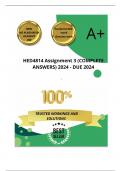,HED4814 Assignment 3 (COMPLETE ANSWERS) 2024 -
DUE 2024 ; 100% TRUSTED Complete, trusted solutions
and explanations.
QUESTION 1. Psychosocial Support and Emotional-
Behavioural Interventions (25 marks) a) Explain the concept of
psychosocial support in an educational context. (5 marks) b)
Discuss three evidence-based strategies for providing emotional
support to students in a classroom setting. (10 marks) c)
Describe a behavioural intervention approach of your choice and
explain how it can be implemented to address challenging
behaviours in the classroom. (10 marks)
Here’s a structured response to Question 1 on Psychosocial
Support and Emotional-Behavioural Interventions. Each
subsection provides clear explanations and relevant strategies,
tailored to meet the marking criteria.
Question 1: Psychosocial Support and Emotional-
Behavioural Interventions
a) Explain the concept of psychosocial support in an
educational context. (5 marks)
Psychosocial Support in Education
Psychosocial support (PSS) in an educational context refers to
the holistic approach aimed at addressing the emotional, social,
and psychological needs of students. It encompasses a range of
strategies and interventions that create a safe and supportive
, learning environment, enabling students to thrive academically
and personally. PSS recognizes that students' mental health and
wellbeing significantly impact their ability to learn and interact
positively with peers and educators.
In schools, PSS can include programs that promote emotional
literacy, resilience, and coping skills. It involves fostering
positive relationships among students and teachers, creating an
inclusive environment, and providing resources for mental
health support. Effective psychosocial support helps students
navigate challenges, such as trauma, stress, or social difficulties,
ultimately enhancing their educational experience and overall
wellbeing.
b) Discuss three evidence-based strategies for providing
emotional support to students in a classroom setting. (10
marks)
1. Mindfulness Practices Mindfulness involves teaching
students to focus on the present moment, promoting relaxation
and emotional regulation. Evidence suggests that mindfulness
practices, such as deep breathing exercises or guided imagery,
can reduce anxiety and improve attention. Implementing short
mindfulness sessions at the beginning or end of class can help
students manage stress and enhance their emotional wellbeing.
2. Peer Support Programs Peer support programs encourage
students to provide emotional assistance to one another.
Research indicates that peer-led initiatives foster a sense of
belonging and reduce feelings of isolation. Teachers can




